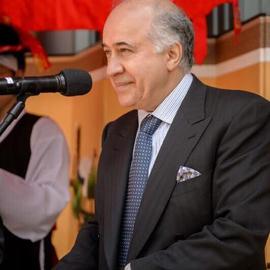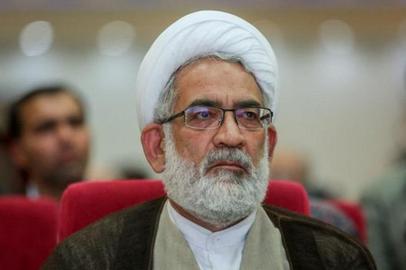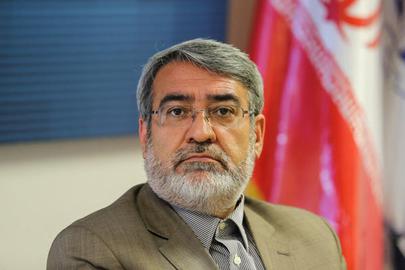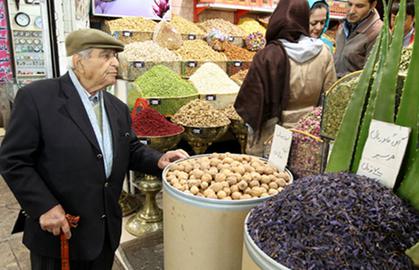Those responsible for attacking and murdering protesters in Iran will be held to account and face prosecution, an Iranian lawyer and arbitrator for an international court has promised.
"The perpetrators of the shootings and killing of people, evidence of which has been published online in recent days, will face international arrest warrants if they enter European jurisdiction or any other country that abides by international criminal law,” says lawyer and judge Kaveh Moussavi. “I hereby assure the Iranian people that when we gather the necessary evidence against them, we will receive their international arrest warrant and we will, without a doubt, arrest them."
Moussavi's remarks are significant in many ways. In recent years, those ordering and perpetrating the political repression in Iran have been convinced that they have performed their legal duties within the framework of Iranian law, have found themselves immune from any punishment and have also been rewarded in practice for their severity. But recently, for the first time in Iranian history, Kaveh Moussavi, who has a long record punishing perpetrators of crimes against humanity, filed a complaint in a Swedish court against Hamid Nouri, one of the men responsible for the 1988 executions at Gohardasht Prison.
The immunity bubble has now burst, and those who are responsible for the violence in Iran over the last week will face justice, Moussavi says.
The perpetrators and those who give orders for political repression in Iran have resorted to two specific excuses when arguing and defending what they have done. The perpetrators of these policies generally declare that they have followed the orders of their supreme authorities and were unable to reject these orders – thus refraining from responsibility for the crimes of imprisoning, torturing, and killing prisoners. Those who give the orders say they have acted in accordance with the law and that they issued orders to maintain the system or enforce the existing laws and regulations. Kaveh Moussavi says none of these arguments are now acceptable in international criminal tribunals. These officials are not immune from criminal responsibility.
Moussavi cites Article 27 of the Islamic Republic's constitution, and says it clearly states that people are free to take part in demonstrations, and that no weapons should be involved. So, even within the rules of the Iranian regime, shooting at unarmed demonstrators is illegal and a crime: "Of course we know they are not respecting their own laws and do not care about these laws, and you cannot expect them to be prosecuted under those laws; the law in Iran has no meaning under the rule of the current system. These people can only be brought to justice under international criminal law and that is exactly what we intend to do."
In the International Criminal Court, there is no pretext or argument for following orders or acting in accordance with the laws of a specific country. According to Kaveh Moussavi, the International Criminal Court has clearly addressed the argument that a person was given an order and had to carry it out. "In the Nuremberg trials, the most important defense and argument for the defendants in all categories, from the highest to the lowest levels, was that they had followed orders,” he says. “However, the Nuremberg tribunal ruled that if the supreme authority's order contravened international law, it is considered illegal, regardless of what domestic laws might say. This means that if the laws of a country in cases related to war crimes, crimes against human rights, and crimes against human dignity contravene international law in each case, that law is void and invalid in international courts and cannot be used as the basis for judging the conduct and decisions of individuals."
As a result, neither can the authorities at various local and national levels nor the police and security forces claim to defend themselves or even justify their conduct in the eyes of their own public, or in their conscience, saying that they acted according to the law or were law enforcers. "Officers, military high rank personnel, law enforcement officers, commanders of the police forces and other officers of all ranks who have been firing on demonstrators and protesters over recent days or thereafter, or who act [in this way] during the process of arresting and torturing them, are required by law to be held accountable,” Moussavi says. “They must be held accountable in international courts, and they will certainly be punished for their actions. They should know that they will not be immune."
International criminal law specifically targets those whose actions result in the torture or killing of those who exercise their right to freedom of expression. "Therefore the reasoning based on the fact that they have executed orders or that they are bound by the laws of their own country cannot release them from punishment,” says Moussavi. “Naturally, the agents shooting people should expect to face trial and be accountable some day."
However, punishment for these people will require the collection of evidence, a means of showing that they have played a role or been responsible for committing these crimes. The Islamic Republic is systematically trying to destroy such evidence or make it unavailable to the public. Moussavi says experience has shown the Iranian government's efforts have been unsuccessful: "It is true that the ruling regime is trying to hide and destroy the documents, but they were not successful in hiding the documents [proving] the 1988 executions and as you see, Hamid Nouri has now been arrested. We will succeed in future cases."
Easier Than Ever Before
Kaveh Moussavi says it is now easier to identify and prosecute human rights abusers and perpetrators of crimes against humanity than ever before. "People's access to recordings of illegal conduct is much greater than in the past; repression is easily documented by citizen journalists, and thus secrecy and denial cannot keep offenders and perpetrators from being punished. Now the names, specifications, addresses, and operations of the crackdown can be very easily documented, and it is much easier to find them and drag them to justice."
With the evidence available so far, online as well as eyewitness reports and videos, if the people responsible for the killings and suppression travel to Europe or “any other country adhering to international criminal law,” they will be arrested and detained. “Do not doubt that when there is evidence against them, we will secure an international arrest warrant,” Moussavi says. “After our success in arresting Nouri and detaining him, and in getting his detention extended, the doors of all countries that are committed to international criminal law, the International Covenant on Torture, and numerous human rights treaties, are now open to us. I assure the Iranian people that we will arrest these people.”
But is it possible under the international criminal law to punish all officials in the Islamic Republic for committing crimes against humanity or war crimes? Kaveh Moussavi says the law is clear: "The person who shot or tortured, the person who ordered the shooting or the torture, the person who was in the position of preventing or opposing these crimes but did nothing, all of them have criminal responsibility and must be held accountable in court."
This includes those who appear to bear no direct responsibility for the crimes. “Take Mohammad Javad Zarif for example; although he is the Foreign Minister of the Islamic Republic, he is politically responsible for the crimes committed by the government and government agents in Iran, and his silence and association with its repressive government makes him responsible for these crimes. The governor of a city, even if he did not order the shooting of the protesters himself, is legally liable to punishment because he could intervene but did not under the principle of 'commander responsibility.' The commander here is the person in charge. The person in charge of the City Security Council has the responsibility and if he does not oppose the shooting order or does not resign in protest, he has to be held accountable."
It’s crucial to identify the key people responsible for these crimes. Once identified, they can be tried under international law, although there may be slight complications if they are able to secure diplomatic immunity. However, Moussavi says officials are not entitled to this immunity unless it is accredited by the country in which they are visiting. At any rate, he says, “diplomatic immunity is not absolute and is definitely time-limited.” Regarding the case lodged in the Swedish courts against Hamid Nouri, Moussavi says, “We are drawing up a list of potential accused so they do not receive diplomatic accreditation anywhere.” He says the concept of diplomatic immunity should not affect that case, or any lodged against the perpetrators of the recent crimes against protesters.
Who Holds Ultimate Responsibility?
But who are the key people guilty of the crackdown on Iranian protesters, the people who have gone out to voice their anger against the rise in gas prices? According to several media reports outside the country, dozens of protesters have been killed, and Iran’s own official reports admit people have died in the protests. As Moussavi says, one can expect them to be arrested if they travel to the European jurisdiction, without a diplomatic immunity.
On Sunday, November 17, the Supreme Leader Ayatollah Ali Khamenei said at a religious gathering that he backed the decision to raise gas prices, and referred to the protesters as thugs who do not love their country. He urged officials in the country to take their duties seriously.
Iranian President Hassan Rouhani also criticized protesters who blocked the roads with their cars as part of their civil protest, and said officials will identify and punish them. He accused them of creating insecurity and disorder and called on the judiciary to act in accordance with the law to take action against them, comments some observers say were code words calling for a further crackdown on critics and dissidents. Rouhani also praised law enforcement and military forces that killed and injured hundreds of people during the protests and praised their actions.
Mohammad Jafar Montazeri, the country's prosecutor general, and Hessamodin Ashena, an adviser to Hassan Rouhani, accused foreigners of interfering with the protests and also threatened to crack down on protesters.
Interior Minister Abdol Reza Rahmani Fazli also issued threats, saying government officials had "tolerated" the protests until then, but, he said, "if protests continue, despite the restraint by the law enforcement and security forces, naturally, they have to carry out their duties." The Interior Minister's tolerance claims came at a time when , nearly 20 protesters had already reportedly been killed by security forces.
The Iranian Ministry of Intelligence also welcomed the remarks of the Leader of the Islamic Republic and said in a statement that the ministry "considers it its duty to deal with any insecurity that undermines the security and peace of the honorable nation" and claimed that they had identified the key players in the "riots." Naturally, responsibility for the Ministry of Intelligence lies directly with the Minister of Intelligence.
Hossein Ashtari, commander of the police force, also accused the protesters of obeying counter-revolutionary organizations and said, "We have identified them and will carry out the punishment in due course." Ashtari also claimed that the police had accomplished its mission with patience during the days of protests.
As Kaveh Moussavi sets out, every official and agent in the Islamic Republic has a political responsibility for what has happened in recent days – and the authorities quoted here appear to have a direct criminal responsibility since they have specifically taken on the protests and know the direct impact that their stances will have on the suppression and killing of protesters.
At the regional and local level, there are other people who are responsible too, in addition to law enforcement and security forces who shoot down protesters or arrest them and subject them to torture and harassment. Given the job description of provincial and county authorities, the members of the Provincial Security Councils and County Security Councils can also be officials with responsibilities for the crackdown.
The provincial and county councils tend to have seven members and they consult and decide on critical security and the political and social affairs of the province or county.
In the provincial council, the provincial governor general, the Revolutionary Guards’ provincial commander, the provincial police commander, the provincial army commander, the provincial intelligence chief, and the province's revolutionary and general prosecutors form the council.
The county councils are comprised of the governor of the county’s main city, the county commander of the Revolutionary Guards, the county commander of the security forces, the commander of the county's garrison, the chief of the county's intelligence office, and the county's revolutionary and general prosecutor.
These officials have a direct criminal responsibility for what they call maintaining the security of the province and the county, and which has actually been a process whereby agents have suppressed and killed protesters. Fars News Agency, which is linked to the Revolutionary Guards, quoted "a security entity" when stating that in the first two days of protests, Friday, November 15 and Saturday, November 16, there were "small and large gatherings" in about 100 locations in Iran, at which people opposed the increase in gas prices, and which led to the arrest of more than 1,000 people.
Videos released on social media show that in many instances, people had been subjected to violence.
It is possible that this widespread violence has prompted people to publish the names and photographs of officials in provincial and county councils in recent days, alongside their posts about protests. The move seems to be an attempt to document and identify the perpetrators of the massacre and the crackdown on protesters. As Kaveh Moussavi says, this is the first step toward launching lawsuits to obtain an international arrest warrants, and the ultimate arrest, prosecution and punishment of them. It is the first step toward bringing the people responsible to justice.
visit the accountability section
In this section of Iran Wire, you can contact the officials and launch your campaign for various problems




























comments